East Jerusalem is a place that lacks classrooms, where students cannot talk openly about their feelings, and where the municipality refuses to meet with Palestinian parents. Orly Noy speaks to the head of the parents’ council about why Palestinian youth have lost all hope.
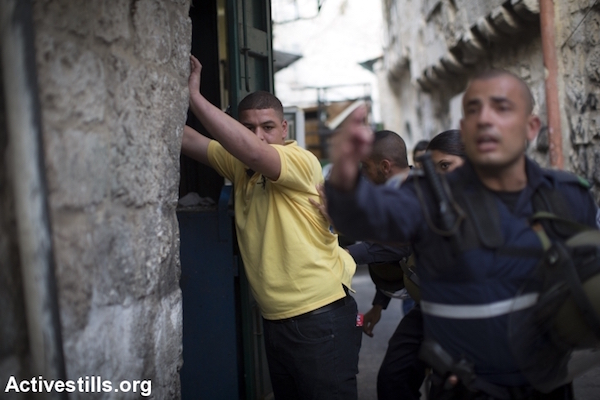
Jerusalem has seen a lot of low moments over the years, a lot of blood, and tons of terror. But news that two cousins, Ahmad and Muhammad Manasra, 13 and 15 years old, stabbed and critically wounded a 25-year-old and a 13-year-old boy, took that horror to new heights.
It’s true that there were much deadlier and much bloodier events over the years. But there’s something about a 13 year old taking a knife and sticking it into the body of another child, of the same age, that suddenly exposes the abyss in which we’ve arrived, in which we can no longer protect our children — on either side.
Media outlets are describing the recent wave of attacks as “child terrorism,” characterized by the young age of many of the attackers. Of the five stabbers who were behind four attacks on Monday, three were under the age of 18. Kids and teens are assuming entirely age inappropriate roles, and they are also being treated accordingly: in a video clip of the aftermath of the stabbing, 13-year-old Ahmed Manasra is seen shot, lying on the ground, and the crowd gathered around him are yelling at the security forces to kill him, a 13-year-old boy lying in a pool of his own blood.
As a rule, Palestinian children don’t really interest the Israeli public. They don’t interest Israelis when the authorities fail to provide them with thousands of classrooms. They aren’t of interest when security forces detain them long before they’ve reached the age of criminal culpability. They aren’t of any interest when police spray their schools with putrid “skunk” water as an act of unabashed collective punishment. And they’re not of any interest when they are shot and killed by police. They are of interest only when they have a knife in their hand and are try and kill somebody.
That’s human nature, it seems — to turn inward, especially at times like these. Who really cares about the wellbeing of a 13-year-old Palestinian kid when the Jewish victim is still fighting for his life? But at the same time, we cannot ignore the situation that results in a child picking up a knife, and sticks it into the body of another child. And if we do ignore it, does that help save the life of the next victim?
Not even 10 percent
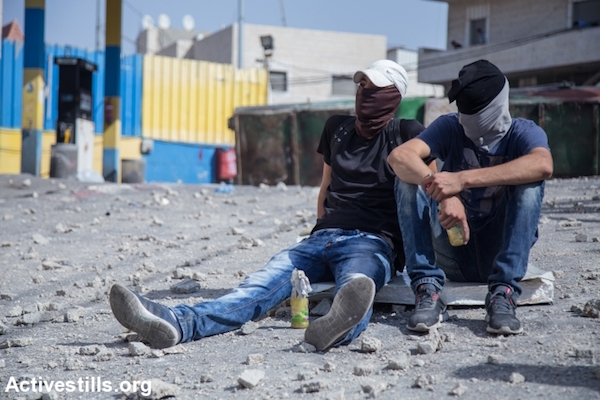
I set out to hear about the everyday lives of youngsters in East Jerusalem from Abed al-Karim Lafi, who served for years as the head of the parents’ council in the eastern half of the city. Lafi is an architect by profession, and in addition to his work on the parents’ council, he also has also led the Sisyphean struggle to get building and planning permits for the residents of his neighborhood, the village of Beit Safafa. Most of the battles Lafi fights with the Israeli authorities have to do with education and construction, in which he almost always faces certain failure. Eight months ago he decided to step down as head of the parents’ council.
“I headed the parents’ council of all of East Jerusalem for 10 years, and I grew tired. I grew tired of the Israeli government and the Jerusalem municipality on the one hand, and of the Palestinian people, who went crazy. We in Jerusalem have no leadership, and that’s very difficult. When you don’t have a guiding hand, everyone does whatever they want, even in education. We have five different educational authorities here: the municipality and the Education Ministry, the Waqf schools and the private schools, the UN schools and the unlicensed private schools. Each one of them does whatever they feel like.”
What was your main struggle over the years?
“The shortage of classrooms, and the Israeli curriculum, which I think is the real occupation of East Jerusalem residents. They shove their curriculums down our throats. Nobody is willing to even hear us or to work with us, so I gave up. If there were somebody we could talk to and who work to advance even 10 percent of our needs, then at least there would be somebody to work with.
I believe that the mayor is a smart man and knows exactly what he’s doing. He kisses you on one cheek while slapping you on the other. Look, the other day he invited all of the parents councils. I would be crazy to go to him two days after he pulled out his weapon and told the Jews to “raise their weapons against the Arabs?” Is he kidding us?
Over the past two months I have been summoned for interrogation twice, once during Ramadan. They told me, “Abed, Jerusalem is moving toward an intifada, a war,” and then wanted me to help them calm the tensions. I told them, “You can calm the tensions. This whole mess started when you let Jews enter Al-Aqsa Mosque. Al-Aqsa is religion, not politics. And when a person feels that his religion is under threat, no one in the world can predict what he or she will do.” I can calm down my son, but who am I to say anything when some crazy woman shouts “Muhammad is a pig” inside the mosque.
Do you recognize this anger among the younger generation?
It is far stronger among the younger generation than among ours. We still think twice, especially since I have a home, a family, responsibility. The teens are part of the home, after all, and they have eyes and ears, they watch TV. Secondly, when they destroy a home, there is always a son of the family, the uncle, the neighbor, the friend — you cannot know what they are saying to one another. When five children need to sleep in one room because the municipality does not grant their father a permit to build, they see what happens. They are part of the nation.
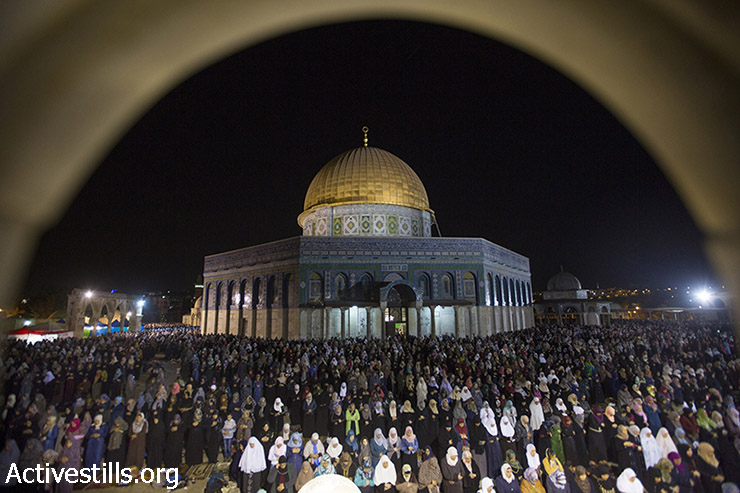
And yet a 13-year-old child takes a knife and stabs another child his age. That’s a different level of extreme.
Perhaps it is difficult for Jews to understand this, but in our religion we believe that you are a shahid (martyr) if you die for your mosque. You are chosen. For children this can be very attractive.
Do the events at Al-Aqsa have more of an influence than, say, the poor infrastructure, housing demolitions, and arrests in East Jerusalem?
Absolutely. After all, we have been suffering from all the things you just described for years. But Al-Aqsa Mosque is not a red line, it’s red blood.
Do you think that Ahmed Manasra stabbed another child for religious reasons?
Ninety percent yes. These are things that are difficult for Jews to understand, but when I see photos on Facebook of the Arab woman who was caught, and a person is just sitting on her, even I go crazy. Who can stand such a thing? And then a person walks by and just kicks her in the end while she is being held down on the floor.
No more trust, no more fear
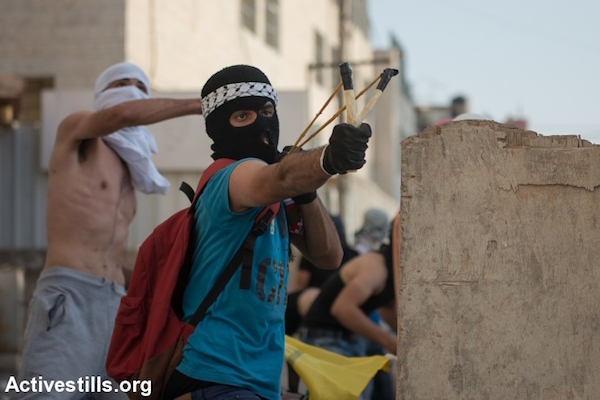
You have been accompanying teenagers in East Jerusalem for many years; have you noticed a radicalization among them?
Absolutely. I can tell you that they no longer listen to anybody. And to tell you the truth, this is the reason I quit. They have no more respect for anyone: not for their teacher, their father, no one. And this radicalization can be found on both sides. Look at the settlers: at first the government supported them, but today the new generation has been radicalized at its core, and even the government itself cannot control them. Extremism on both sides. But East Jerusalem is even more dire, because the settler knows he has a father, that he has a government that is protecting him. Who protects the Arab child? The father? The poor father can’t even protect himself. So they have lost all hope in adults, in life, and in peace.
Is there a group of professionals, psychologists or social workers, who are trying to deal with this situation?
What are you talking about? If I want to speak to the children, the police will arrest me! If I try to speak with these children, I turn into a collaborator on the Palestinian side and an inciter on the Israeli side. The same thing happens with psychologists or social workers. And those who lose are the children. Children whose classmate was killed and no one is talking to them? Should the teacher ask to hear how they are feeling, which in Israeli society is considered a positive thing, it will be deemed incitement.
This is why I am telling you that the next generation will be even more extreme than this one, since no one can speak with them. We are not allowed to. What we have seen along the way (rows of Palestinians detained on the side of the road on the way to his office in Beit Safafa, o.n.) is nothing. This morning I saw three soldiers telling a young man to pull down his pants with my own eyes. Can this young man then listen to me or you or anyone else? Do you know how many parents have told me that when they try to speak with their children, the child says “you’re a coward” to his father? So what can they do? The way the kids see it, we are no longer in the picture.
And along with their trust in adults, they are also losing their fear.
Exactly. They are no longer scared. The pressure the state puts on them has brought them to a place where life and death are the same thing. This is very painful for us. You are a mother, you understand what I am talking about. Every mother and father goes crazy when even their kid is sick. So what are we supposed to say?
So the children here live in hell and no one talks to them about it? Not even the teachers?
Go to the municipality and ask whether teachers can speak to their students about what is happening. They are not allowed. And if they say yes that means they are lying. On Nakba Day, when you celebrate Independence Day, a teacher came in and spoke about the meaning of Nakba and the meaning of independence. Even before the day was over the police came to summon her for interrogation.
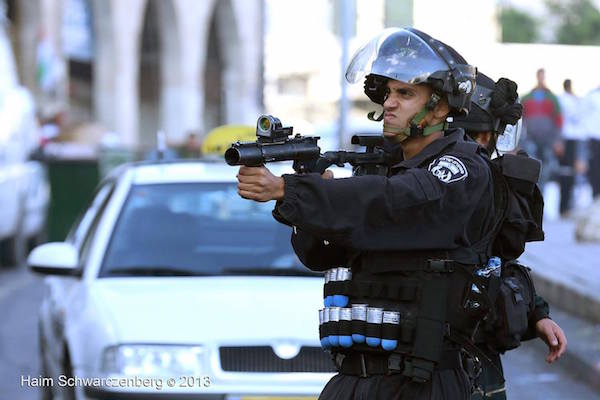
Lafi reminds me that many Jews prefer to either forget or deny the fact that Palestinian children have been living in a war that has, in fact, always affected them. “Tell me what other country arrests a five-year-old child. Even if he had a stone. Even then. Five years old! They have no shame.”
He pulls out his cellphone, showing me a photo of a small Palestinian child, around five, photographed from behind while holding a stone.
“Do you think this child is endangering anyone?” he asks me. No, this child does not look dangerous. He looks mostly miserable. He looks like a victim of a terrible situation in which the adults never took responsibility, never learned to build him a safer place, and totally abandoned him. Just like so many children on both sides of the conflict. Just like Ahmed Manasra and his victim, who is fighting for his life.
This article was first published in Hebrew on Local Call. Read it here.


